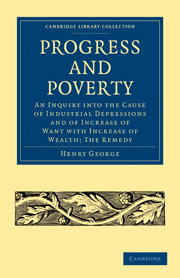 Progress and Poverty
Progress and Poverty Book contents
- Frontmatter
- PREFACE TO FOURTH EDITION
- Contents
- INTRODUCTORY
- BOOK I WAGES AND CAPITAL
- BOOK II POPULATION AND SUBSISTENCE
- BOOK III THE LAWS OF DISTRIBUTION
- BOOK IV EFFECT OF MATERIAL PROGRESS UPON THE DISTRIBUTION OF WEALTH
- BOOK V THE PROBLEM SOLVED
- BOOK VI THE REMEDY
- BOOK VII JUSTICE OF THE REMEDY
- Chapter I Injustice of private property in land
- Chapter II Enslavement of laborers the ultimate result of private property in land
- Chapter III Claim of land owners to compsnsation
- Chapter IV Property in land historically considered
- Chapter V Property in land in the United States
- BOOK VIII APPLICATION OF THE REMEDY
- BOOK IX EFFECTS OF THE REMEDY
- BOOK X THE LAW OF HUMAN PROGRESS
- CONCLUSION
- INDEX
Chapter I - Injustice of private property in land
Published online by Cambridge University Press: 07 September 2011
- Frontmatter
- PREFACE TO FOURTH EDITION
- Contents
- INTRODUCTORY
- BOOK I WAGES AND CAPITAL
- BOOK II POPULATION AND SUBSISTENCE
- BOOK III THE LAWS OF DISTRIBUTION
- BOOK IV EFFECT OF MATERIAL PROGRESS UPON THE DISTRIBUTION OF WEALTH
- BOOK V THE PROBLEM SOLVED
- BOOK VI THE REMEDY
- BOOK VII JUSTICE OF THE REMEDY
- Chapter I Injustice of private property in land
- Chapter II Enslavement of laborers the ultimate result of private property in land
- Chapter III Claim of land owners to compsnsation
- Chapter IV Property in land historically considered
- Chapter V Property in land in the United States
- BOOK VIII APPLICATION OF THE REMEDY
- BOOK IX EFFECTS OF THE REMEDY
- BOOK X THE LAW OF HUMAN PROGRESS
- CONCLUSION
- INDEX
Summary
When it is proposed to abolish private property in land the first question that will arise is that of justice. Though often warped by habit, superstition, and selfishness into the most distorted forms, the sentiment of justice is yet fundamental to the human mind, and whatever dispute arouses the passions of men, the conflict is sure to rage, not so much as to the question “Is it wise?” as to the question “Is it right?”
This tendency of popular discussions to take an ethical form has a cause. It springs from a law of the human mind; it rests upon a vague and instinctive recognition of what is probably the deepest truth we can grasp. That alone is wise which is just; that alone is enduring which is right. In the narrow scale of individual actions and individual life this truth may be often obscured, but in the wider field of national life it everywhere stands out.
I bow to this arbitrament, and accept this test. If our inquiry into the cause which makes low wages and pauperism the accompaniments of material progress has led us to a correct conclusion, it will bear translation from terms of political economy into terms of ethics, and as the source of social evils show a wrong. If it will not do this, it is disproved.
- Type
- Chapter
- Information
- Progress and PovertyAn Inquiry into the Cause of Industrial Depressions and of Increase of Want with Increase of Wealth; The Remedy, pp. 299 - 311Publisher: Cambridge University PressPrint publication year: 2009First published in: 1881


